Ever thought of buying straight from manufacturers in China to save costs and improve the quality of your goods?
If this sounds like you, then you’re in the right place. Getting goods directly from Chinese factories can seem hard with all the rules and cultural differences, but don’t fret! This guide will give you all the step-by-step tips you need, from finding the right suppliers to managing transport.
Since I started my journey with e-commerce in 2016, I have made several bulk orders from various supplier types in China so I can give you my own personal tips throughout this article.
1. Understanding the Supplier Types in China
When sourcing directly from China, it’s crucial to understand the different types of suppliers and their roles. This will help you determine the best partners for your needs.
Manufacturers
Manufacturers make products from raw materials. Working directly with manufacturers can cut costs by removing intermediaries from the supply chain. Verify their capabilities match your production requirements.
Wholesalers
Wholesalers purchase goods from manufacturers in bulk and then sell smaller quantities to vendors, this adds costs. Wholesalers can be good for small test batches.
Trading Companies
Trading companies don’t manufacture. They connect overseas customers to domestic manufacturing sources. This simplifies the process but increases costs.
For more information, I have a an article on the difference between trading companies and manufacturers.
Agents
Often referred to as soucing agents or dropshipping agents, agents act as a liaison between you and the manufacturer. They facilitate the relationship, communication, contracts, logistics, and quality control. Agents charge service fees but reduce risks.
In summary, manufacturers offer the biggest cost savings yet require vetting but may not offer the same services as other supplier types. Wholesalers and trading companies cost more but simplify sourcing. Agents provide helpful services for a fee. Analyze your priorities to pick the best partner.
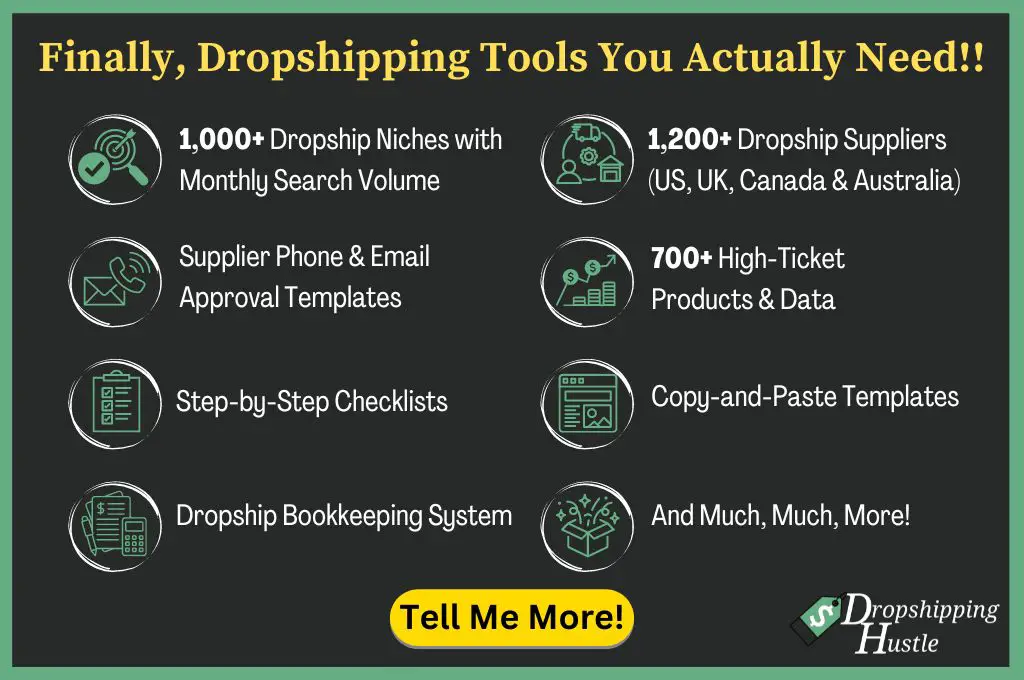
2. How to Source Manufacturers
There are many different options when it comes to sourcing Chinese manufacturers, however, there are only a few options I would recommend.
Alibaba
Alibaba is the go-to platform for sourcing Chinese manufacturers due to its extensive reach and features.
Alibaba offers a huge choice of products and suppliers. Its user-friendly interface, detailed supplier profiles, and secure payment options make it popular among businesses seeking quality Chinese manufacturers.
Additionally, Alibaba’s transparency and communication tools make it the preferred platform for businesses looking to establish partnerships with manufacturers in China.
Sourcing Agent
Sourcing agents serve as middlemen for businesses seeking Chinese manufacturers. They bring knowledge, industry expertise, and established relationships that streamline the supplier selection process.
Whilst sourcing agents will add an additional cost on top of working directly with a manufacturer, the services they offer can make it a worthwhile expense for businesses.
Sourcing agents help navigate language barriers, negotiate favorable terms, and ensure quality control. Their presence in China provides insights into the manufacturing industry, enabling businesses to make informed decisions and secure reliable suppliers.
For businesses looking to source products from China efficiently and effectively, sourcing agents offer a strategic advantage.
If you want more information I have several articles on agents based in China.
- Best dropshipping agents in China – Huge List
- What does a dropshipping agent do? 20 advantages
- How much are sourcing agent fees?
Canton Fair
If you’re in a position to visit China, the Canton Fair is the ideal way to source manufacturers and build relationships.
The Canton Fair, also known as the China Import and Export Fair, is a renowned trade event that offers an exceptional opportunity for sourcing Chinese manufacturers. Held biannually in Guangzhou, China, it attracts exhibitors representing diverse industries.
The fair provides a firsthand experience of meeting potential suppliers, inspecting products, and meeting with Chinese manufacturers.
Additional Methods for Sourcing Chinese Manufacturers
Whilst the 3 options above are my go-to avenues for sourcing the best manufacturers, there are many other choices depending on your business needs.
- Global Sources: A platform that also organizes trade shows.
- Made-in-China: A platform that connects international buyers with Chinese suppliers.
- Industry Associations: Associations related to your product category often have directories of credible manufacturers.
- Online Search Engines: Utilizing platforms like Google for searching manufacturing clusters or specific product manufacturers.
- Networking: Engaging in forums, online groups, or visiting industry-specific events to get referrals and recommendations.
- Government Trade Offices: Some government trade offices provide lists of reputable manufacturers.
- Manufacturing Directories: Websites like China Manufacturer Directory or China Suppliers Directory list numerous manufacturers in various industries.
- Visit Manufacturing Hubs: Visiting places known for manufacturing, like Shenzhen for electronics or Guangzhou for garments, can also be beneficial.
3. Identifying and Vetting Manufacturers
Alibaba is the most popular choice for most beginners looking to find the best manufacturers so I will use it for this example.
By default, Alibaba will have the search feature set to products, click on the products tab and change it to manufacturers. This will filter all results by manufacturers as opposed to products or suppliers.
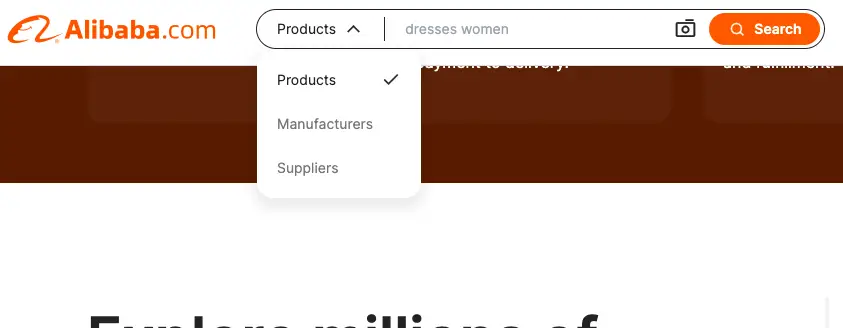
The next step is to vet the manufacturers so you can narrow down your search and only be shown the best manufacturers.
First, you want to filter the results based on what is important to you. Trade Assurance and Verified Supplier are non-negotiable supplier attributes so I would click them.
Each product category will have different filtering options which can really help to only show gold tier manufacturers from the rest. For example:
Capabilities
The capability filter will allow you to search for manufacturers who have certain abilities or machinery within their factory that can produce or design products to specific needs.
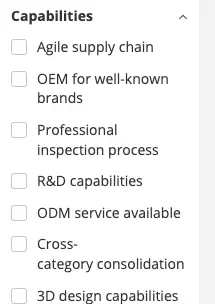
Country/Region
You can choose to work with manufacturers that are based in specific Countries or Regions.
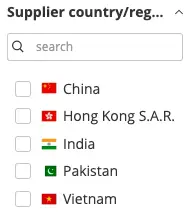
Management Certifications
Management certifications confirm that factories have taken steps and adhered to specific certifications. This will be important depending on the location you’re selling to and meeting their legal requirements. You can check that list of certifications here.
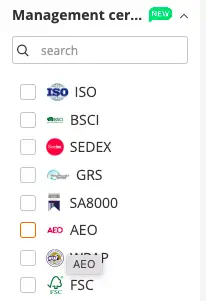
Product Certifications
Product certifications confirm specific product has passed performance and quality assurance tests. Be sure to check the box to confirm the factory you’re working with meets the product standards for the Country you’re selling to. You can check that list of certifications here.
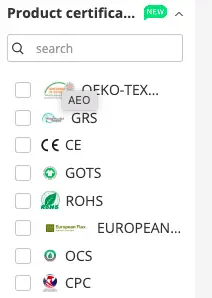
Company Profile
You can then click on the “View Profile” button to provide you with all the information you need including the number of staff, years in business, reviews, orders, response times, factory photos and much more.
Another tip is to take notice of the first word in the company’s name. In the example below it is Dongguan.
This is important as the first word for each company is the region they are located and you want to work with manufacturers that are located in regions where they have access to the best resources for that specific category of product. Each region of China will specialize in specific industries.
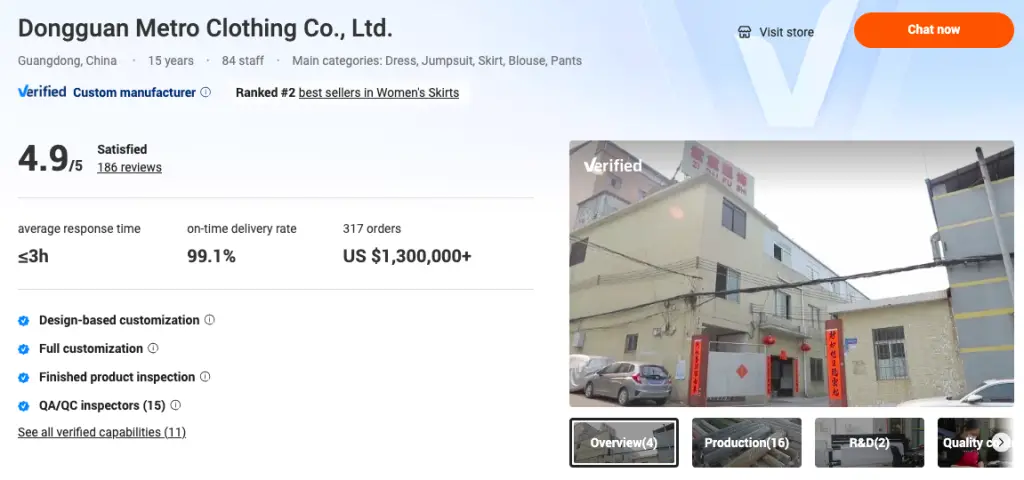
4. Contacting Manufacturers
Firstly, Alibaba’s own messaging service is reliable and similar to email. While it might not be the most efficient communication option, it does record all interactions. This documentation can be helpful as it can resolve any potential disputes down the line.
On the other hand, many manufacturers might lean towards using WeChat for communications. Think of WeChat as China’s answer to WhatsApp – it’s widely used and tends to provide quicker responses.
I recommend you read my article on questions to ask Alibaba suppliers before you contact them.
However, be prepared for some future spammy calls and texts from various suppliers (I learned this the hard way). I recommend using an alternative number to contact them.
Alternatively, if you’re keen on streamlining the quotation process, Alibaba’s RFQ (Request for Quote) feature is an option. It’s essentially a shortcut to receiving quotes from suppliers without engaging in individual conversations.
You simply submit your product requirements via Alibaba, and the platform dispatches this information to relevant suppliers. They, in turn, send you their quotations, similar to a bidding system. This not only saves time but also potentially allows you to source products at the most competitive prices without entering into negotiations.
I have an article you can use here called 7 inquiry templates for contacting Alibaba suppliers. You can choose which template suits your goals and alter it as you need.
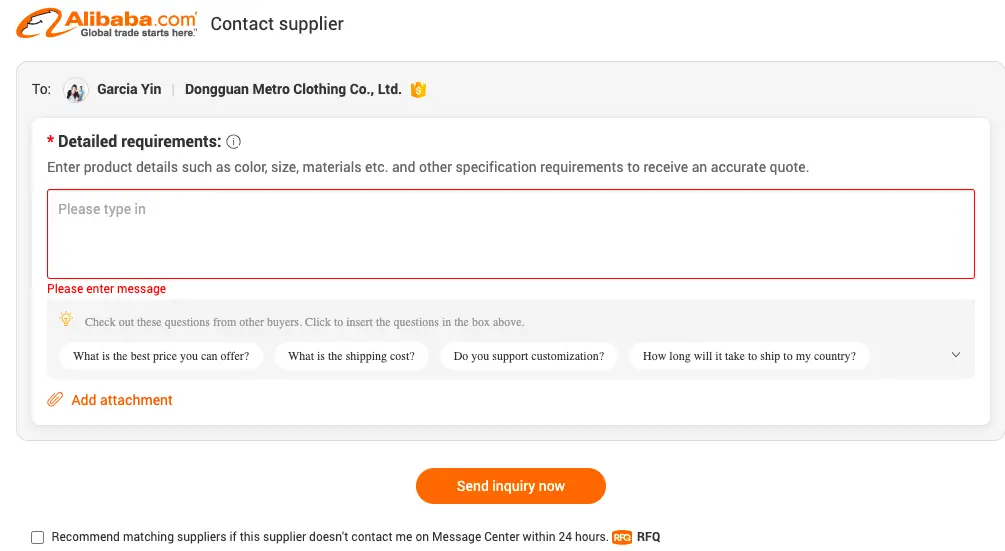
5. Verifying Product Quality
The very first step in this process is to filter your manufacturers by product certifications. Simply click the boxes under the “Product certifications” that align with the product safety standards within your niche.
Once you know your manufacturer complies with the product standards, send the factory an inquiry requesting detailed specifications of the materials, components, processes, etc for the product you’re sourcing.
For an additional layer of quality control, you can ask about quality control procedures, testing protocols, and factory audit compliance.
Once you’re happy with everything at this stage, it’s time to order samples. I have an article on how to order samples from Alibaba for more details. I suggest you read that first as ordering samples is a vital step in the manufacturing purchasing process.
Whilst most people will only order samples once before making a bulk order, if you want to do a thorough product quality inspection, I suggest you order samples at 3 different stages.
Development Sample
The development sample is the first sample you order and is to test the quality and confirm the product is how it looks in the images. This can give you some ideas for future iterations and improvements that can be made.
Pre-production Sample
Once you have worked with the manufacturer to make improvements on the development sample, you will want to order a pre-production sample to test the product. It may be worth ordering 3 to 5 samples to test and once you’re happy you can make your deposit and start the development stage.
Pre-shipment Sample
The pre-shipment sample is the sample you order after production and before shipping the goods. This is important as you want to verify the product quality before shipping to your customers. The Pre-shipment and sample and the pre-production sample should be identical without any discrepancies.
6. Negotiating Terms
Negotiating terms often goes beyond just trying to get the lowest possible cost for a product. While important, there are various other aspects to consider.
Negotiating a lower MOQ, better shipping options or improved product materials may be a better choice for many merchants. I have an article on negotiating a lower MOQ with Alibaba suppliers if you require more details.
The best piece of advice I can offer for negotiating better terms is to build relationships. Suppliers and manufacturers in China often work with sellers who purchase from them once and that’s it.
Make it clear to the manufacturer that your goal is to build a long-term partnership with their company and you plan to buy from them for years to come. Research their company and ask questions that show you’re knowledgable and give the perception you are a professional and you cannot be taken advantage of.
I have an article on 12 tips to avoid being scammed by Alibaba suppliers for more info.
The key to building a long-term relationship is to negotiate fair and reasonable terms that benefit both you and the manufacturer. You should have the mindset that you are choosing a business partner as opposed to finding the best possible price for you even if it does not benefit the factory.
It’s important to be aware of Chinese business practices and cultures will help you form stronger relationships and avoid miscommunication.
Guanxi is a concept in China relating to the importance placed on developing trusted, reciprocal personal relationships in business dealings. Take time to get to know your contacts and build rapport.
Traditional Chinese culture relies heavily on hierarchical relationships and demonstrating respect, especially towards elders and authority figures. Use appropriate titles when communicating with suppliers and manufacturers.
7. Shipping and Logistics
Buying from Chinese factories and getting it shipped involves a few important steps. Let’s break it down into simpler terms!
First, you’ll want to check out the prices for sending items with different shipping companies. There are a few ways your items can travel: by air, sea, or rail. While planes offer fast shipping, they’re also the priciest option.
Don’t forget, there are extra costs like customs (the fees for moving goods between countries), taxes, and insurance. So, make sure to add these to your budget to avoid any surprises.
When you’re shipping a whole container, you’ll need to decide who manages the transport. If you choose FOB, the factory takes care of things until the goods get on the ship. If you go for CIF, the factory also covers the cost, insurance, and freight to your destination.
For more info, I have an article on the different Alibaba Tadre Terms and what each of term means.
If your order isn’t too big, using a freight forwarder (a company that helps manage shipping) can make things easier and might even save you some money by combining your shipment with others.
Before you start buying, have a good chat with the factory about all the delivery details and make sure everything is clear and agreed upon.
Make sure your items are packed well and have the right labels and paperwork. This helps avoid any hold-ups at customs.
Before you pay and accept delivery, check your items carefully to make sure everything’s correct and in good shape.
In a nutshell, with some careful planning and clear chats with the factory, you can make sure your items get from China to you smoothly and without any hiccups!
Conclusion (Additional Tips)
As I have ordered products many times from China, I won’t bore you with the usual conclusion but instead, give you some of my top tips for buying directly from manufacturers in China.
1. Don’t discount Trading Companies. Whilst it’s best to avoid middlemen and go directly to the source, often Trading Companies have better connections and offer services that may benefit your business which manufacturers cannot.
2. If a sourcing agent will not allow you direct communication with the manufacturer, don’t work with them. This line of communication is vital as issues will arise and often you need that direct line of communication.
3. It’s possible a supplier could lie about being a manufacturer when they are actually a Trading Company. If you are concerned about this, make a video call to the supplier and ask for them to show you around the factory and their machinery.
4. Research the company you plan to contact and ask them questions about their machinery and processes. This shows your professionalism and reduces the chance they will try to take advantage of you.
5. Be sure to check this map of the China manufacturing distribution. The manufacturer you work with should be located within the region that specializes in that industry.
6. Don’t work with a manufacturer who produces products from various categories, you want to work with a manufacturer who specializes in your specific category of products.
7. Import Yeti is a great tool for spying on competitors and checking the orders and shipping information from Chinese suppliers.
8. Clearing customs for large bulk orders can be a problem and cause delays, Border Buddy is a service that can help you clear customs easily.


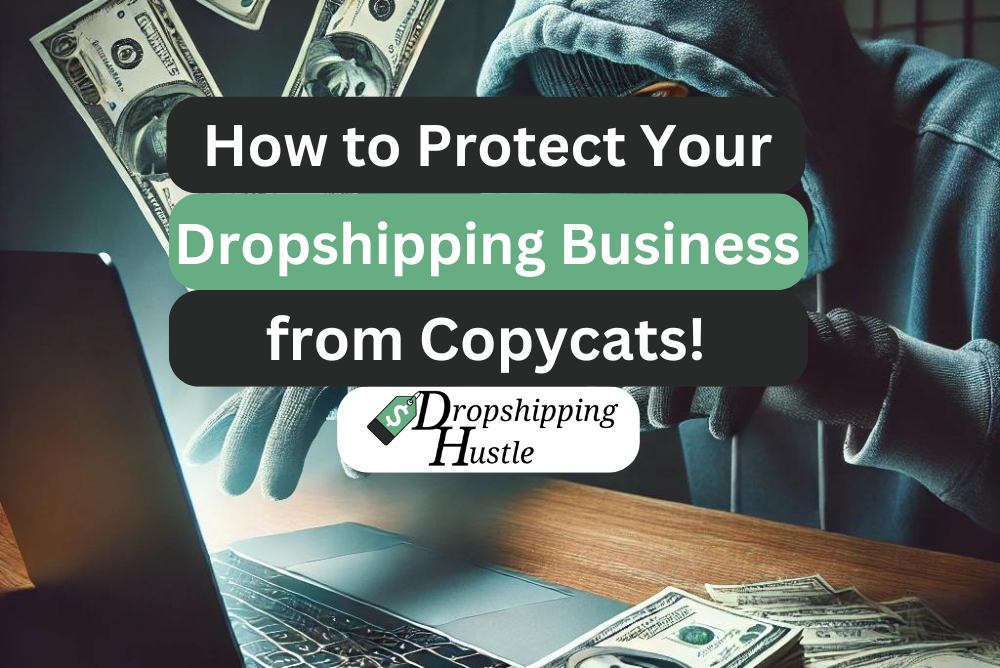

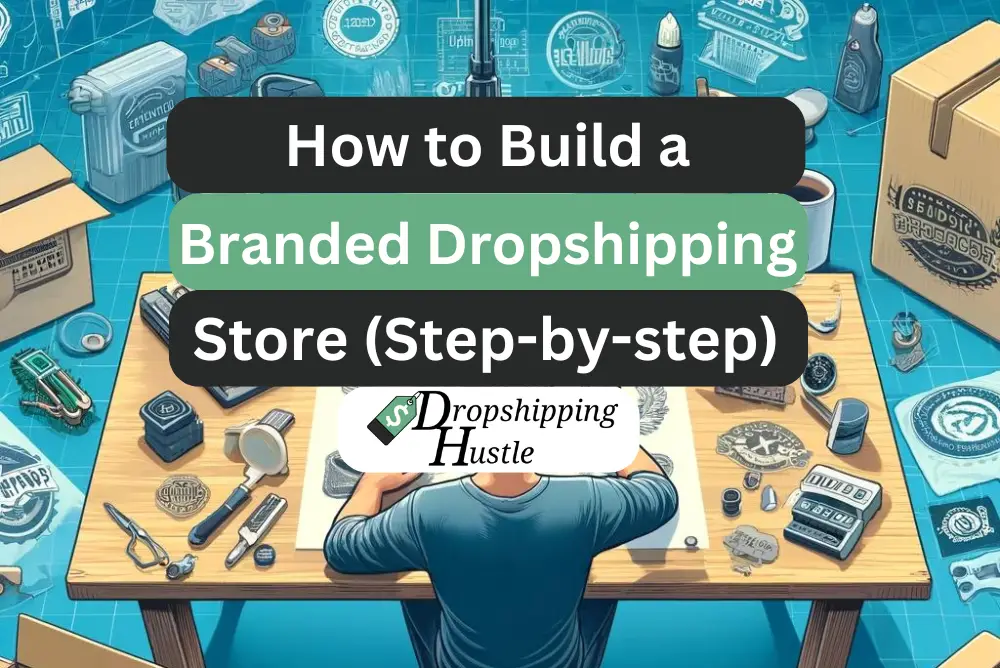

Leave a Reply